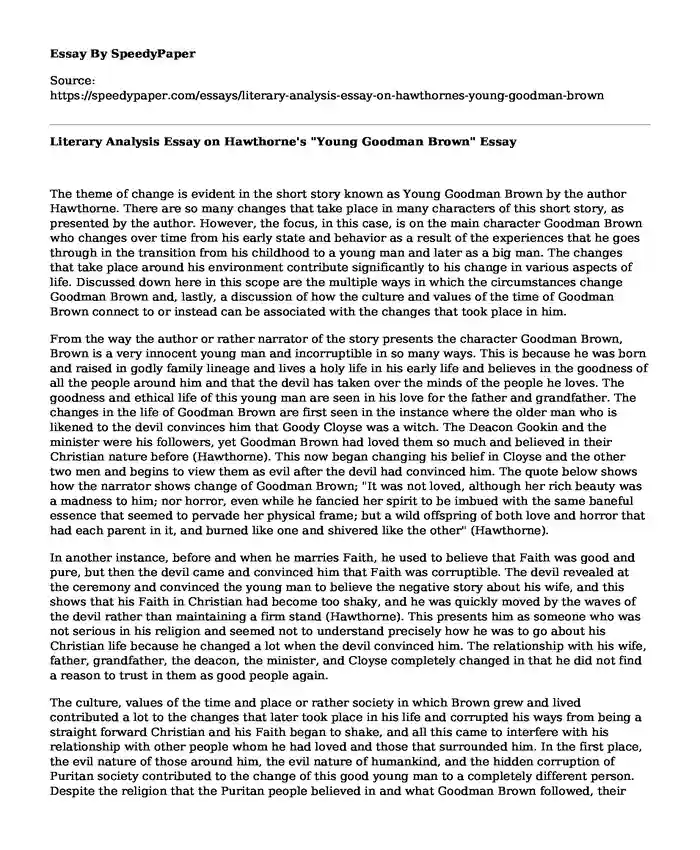
| Type of paper: | Essay |
| Categories: | American literature |
| Pages: | 3 |
| Wordcount: | 763 words |
The theme of change is evident in the short story known as Young Goodman Brown by the author Hawthorne. There are so many changes that take place in many characters of this short story, as presented by the author. However, the focus, in this case, is on the main character Goodman Brown who changes over time from his early state and behavior as a result of the experiences that he goes through in the transition from his childhood to a young man and later as a big man. The changes that take place around his environment contribute significantly to his change in various aspects of life. Discussed down here in this scope are the multiple ways in which the circumstances change Goodman Brown and, lastly, a discussion of how the culture and values of the time of Goodman Brown connect to or instead can be associated with the changes that took place in him.
From the way the author or rather narrator of the story presents the character Goodman Brown, Brown is a very innocent young man and incorruptible in so many ways. This is because he was born and raised in godly family lineage and lives a holy life in his early life and believes in the goodness of all the people around him and that the devil has taken over the minds of the people he loves. The goodness and ethical life of this young man are seen in his love for the father and grandfather. The changes in the life of Goodman Brown are first seen in the instance where the older man who is likened to the devil convinces him that Goody Cloyse was a witch. The Deacon Gookin and the minister were his followers, yet Goodman Brown had loved them so much and believed in their Christian nature before (Hawthorne). This now began changing his belief in Cloyse and the other two men and begins to view them as evil after the devil had convinced him. The quote below shows how the narrator shows change of Goodman Brown; "It was not loved, although her rich beauty was a madness to him; nor horror, even while he fancied her spirit to be imbued with the same baneful essence that seemed to pervade her physical frame; but a wild offspring of both love and horror that had each parent in it, and burned like one and shivered like the other" (Hawthorne).
In another instance, before and when he marries Faith, he used to believe that Faith was good and pure, but then the devil came and convinced him that Faith was corruptible. The devil revealed at the ceremony and convinced the young man to believe the negative story about his wife, and this shows that his Faith in Christian had become too shaky, and he was quickly moved by the waves of the devil rather than maintaining a firm stand (Hawthorne). This presents him as someone who was not serious in his religion and seemed not to understand precisely how he was to go about his Christian life because he changed a lot when the devil convinced him. The relationship with his wife, father, grandfather, the deacon, the minister, and Cloyse completely changed in that he did not find a reason to trust in them as good people again.
The culture, values of the time and place or rather society in which Brown grew and lived contributed a lot to the changes that later took place in his life and corrupted his ways from being a straight forward Christian and his Faith began to shake, and all this came to interfere with his relationship with other people whom he had loved and those that surrounded him. In the first place, the evil nature of those around him, the evil nature of humankind, and the hidden corruption of Puritan society contributed to the change of this good young man to a completely different person. Despite the religion that the Puritan people believed in and what Goodman Brown followed, their actions were never godly and Christian in any way, and that is why Goodman ended up to be corruptible. The actions of Goodman Brown to the wife and people around him when he visits the forest showed the corruptibility and evil in the hearts of even those who are known as the most faithful Puritans like him. He remained to be dynamic throughout his life, and this was as a result of the experiences and the culture of the people that surrounded him.
Work Cited
Hawthorne, Nathaniel. Young Goodman Brown. Harpercollins Canada, 2014.
Cite this page
Literary Analysis Essay on Hawthorne's "Young Goodman Brown". (2023, Apr 01). Retrieved from https://speedypaper.net/essays/literary-analysis-essay-on-hawthornes-young-goodman-brown
Request Removal
If you are the original author of this essay and no longer wish to have it published on the SpeedyPaper website, please click below to request its removal:
- Healthcare Essay Sample: Prevalence of Cardiovascular Conditions in Hispanics
- Essay Example on Center for Disease Control
- Free Essay: Slavery, Race, and Racism
- Cause of the Exxon Valdez Oil Spill, Free Paper Sample
- Human Trafficking in Thailand, Essay Example
- Global Inequities Essay Sample
- Free Essay - the Rio Grande River
Popular categories




